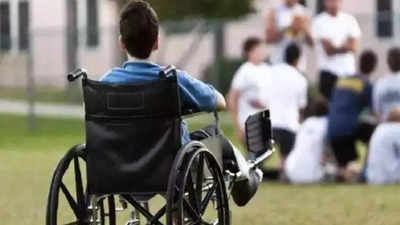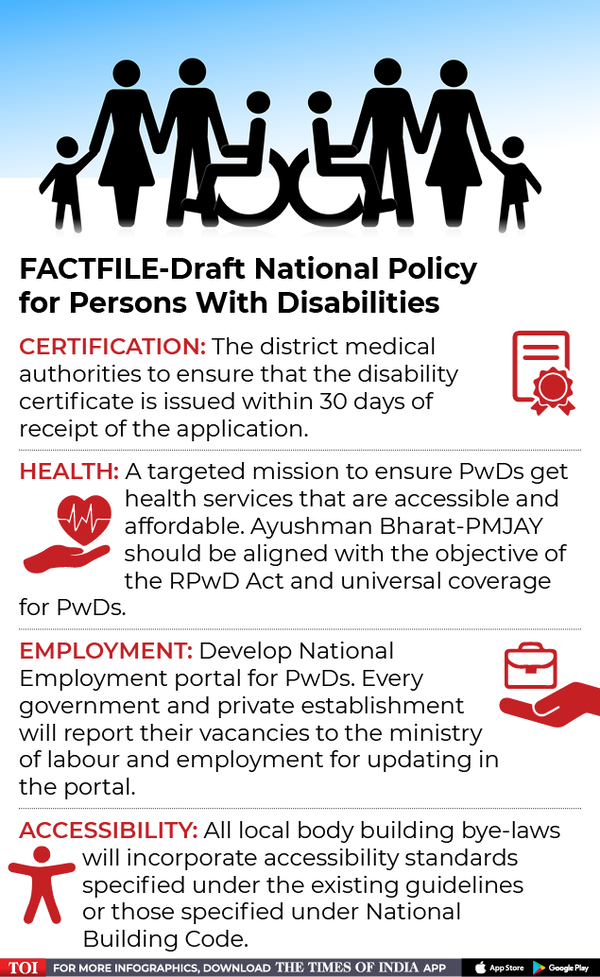- News
- India News
- New Policy for disabled paves way for early intervention centres, employment portal & national database
Trending
This story is from June 14, 2022
New Policy for disabled paves way for early intervention centres, employment portal & national database

NEW DELHI: Taking note of research findings that show one-third of disabilities in children are preventable if detected early, the new draft National Policy for Persons with Disabilities that will replace the 2006 policy once approved, calls for developing a network of ‘Cross Disability Early Intervention Centres’ (CDEICs) in every district of the country.
The draft also addresses the issue of employment, accessibility and certification of disability. It talks of creating a national database of PwDs and a national employment portal for PwDs.
The new policy put out for public comment till July 9 emphasises that a comprehensive national programme on prevention of disability should be developed not only to take care of the entire gamut of disabilities covered under the Rights of Persons With Disabilities Act 2016, but also other medical conditions which are considered as risk cases that may manifest into any form of disability.

The draft policy lays out the broad roadmap for developing CDEICs in every district to provide facilities like screening and identification and referral for rehabilitative services. The EICs would also be given access to the
The draft policy in a chapter on health also states that the government's flagship scheme Ayushman Bharat-PMJAY should be aligned with the objective of the RPwD and provide universal coverage for PwDs.
The new policy, as per the Department of Empowerment of Persons with Disabilities (DEPwD) of the ministry of social justice and empowerment, has been drawn in keeping with the provisions of the RPwD Act and the vision of the National Education Policy 2020 which promotes inclusive education.
As per Census 2011, there were 2.68 crore PwDs. The literacy rate of the total PwD population was about 55%. As regards higher education, only about 5% of PwDs were graduates and above.
The draft policy draws upon the NEP-2020 to assert on the need for aligning The Right to Education Act, 2009 with the RPwD Act by including specific concerns of children with disabilities. NEP is cited to further emphasise that states/UTs must insert a provision to ensure compliance of the provisions of RPwD Act, 2016 by educational institutions while recognizing/granting permission to them.
In the chapter on accessibility, the policy document lays emphasis that all local body building bye-laws will have to incorporate accessibility standards specified under the guidelines or those specified under National Building Code.Also the ministry of road transport and highways will issue necessary guidelines for making modification in the personal vehicles being used by PwDs.
The policy states that to ensure speedy issuance of Unique Disability IDs, the district medical authorities will ensure that the certificate is issued within 30 days of receipt of the application. Also every district hospital must have the equipment and facilities for testing of blood disorders, assessment of locomotor, visual and hearing disability (BERA Test).

The draft also addresses the issue of employment, accessibility and certification of disability. It talks of creating a national database of PwDs and a national employment portal for PwDs.
The new policy put out for public comment till July 9 emphasises that a comprehensive national programme on prevention of disability should be developed not only to take care of the entire gamut of disabilities covered under the Rights of Persons With Disabilities Act 2016, but also other medical conditions which are considered as risk cases that may manifest into any form of disability.

As per Census 2011, there are about 20.42 lakh children in the age group of 0-9 years who have some form of disabilities — either congenital or acquired. Research studies have shown that early childhood (0-6 years) of a human life is the critical period when early symptoms of any deformities or risk can be detected and steps can be taken to prevent disability or reduce its severity.
The draft policy lays out the broad roadmap for developing CDEICs in every district to provide facilities like screening and identification and referral for rehabilitative services. The EICs would also be given access to the
Unique Disability Identification (UDID) portal for helping parents for assessment and certification of disability.
The draft policy in a chapter on health also states that the government's flagship scheme Ayushman Bharat-PMJAY should be aligned with the objective of the RPwD and provide universal coverage for PwDs.
The new policy, as per the Department of Empowerment of Persons with Disabilities (DEPwD) of the ministry of social justice and empowerment, has been drawn in keeping with the provisions of the RPwD Act and the vision of the National Education Policy 2020 which promotes inclusive education.
As per Census 2011, there were 2.68 crore PwDs. The literacy rate of the total PwD population was about 55%. As regards higher education, only about 5% of PwDs were graduates and above.
The draft policy draws upon the NEP-2020 to assert on the need for aligning The Right to Education Act, 2009 with the RPwD Act by including specific concerns of children with disabilities. NEP is cited to further emphasise that states/UTs must insert a provision to ensure compliance of the provisions of RPwD Act, 2016 by educational institutions while recognizing/granting permission to them.
In the chapter on accessibility, the policy document lays emphasis that all local body building bye-laws will have to incorporate accessibility standards specified under the guidelines or those specified under National Building Code.Also the ministry of road transport and highways will issue necessary guidelines for making modification in the personal vehicles being used by PwDs.
The policy states that to ensure speedy issuance of Unique Disability IDs, the district medical authorities will ensure that the certificate is issued within 30 days of receipt of the application. Also every district hospital must have the equipment and facilities for testing of blood disorders, assessment of locomotor, visual and hearing disability (BERA Test).
End of Article
FOLLOW US ON SOCIAL MEDIA










